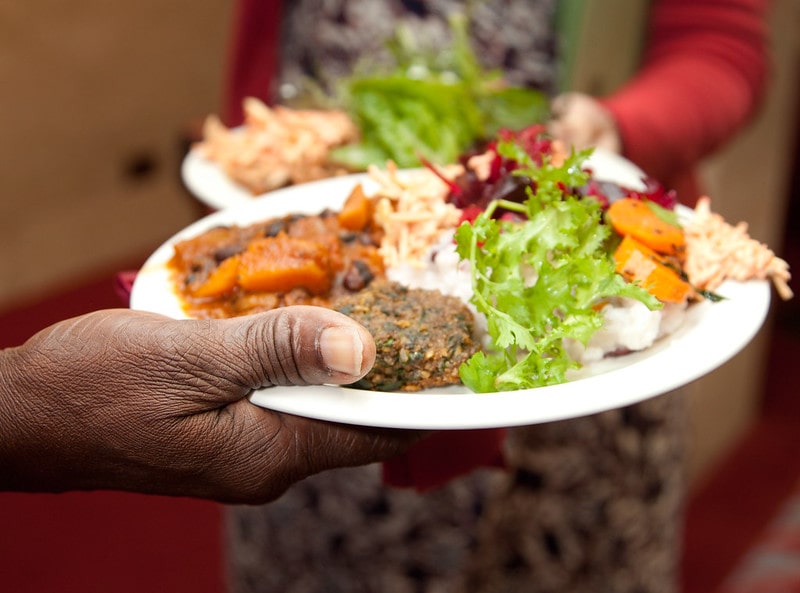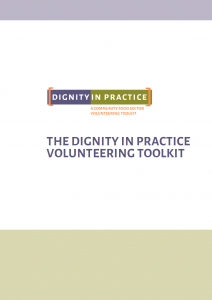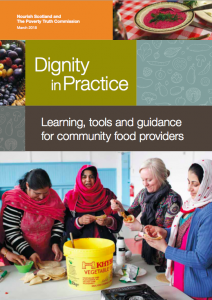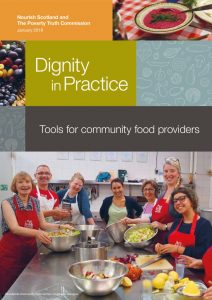Dignity in Practice project

Adapted guidance during coronavirus emergency
During the coronavirus (COVID-19) emergency, we will be regularly updating our resources and guidance to support community food initiatives seeking to support people facing food insecurity. For this, are working closely with our volunteers with experience of food insecurity and members of the Dignity Peer Network, a growing group of community food initiatives across Scotland.
More information:
A practice development programme for community groups working to promote and enhance dignity in responses to food insecurity.
Communities cannot be held responsible for, or bear the disproportionate burden of, food insecurity in Scotland, but, with appropriate support, the community food sector is well placed to respond to current crises and promote and restore dignity at a local level. We believe that ending household food insecurity and becoming a Good Food Nation requires all of us to work together. We will need both national action to secure decent incomes and the strategic and coordinated development of community food infrastructure to deliver on health and social inclusion.
The Dignity in Practice project works alongside community food groups and organisations to explore the detail of what promoting and enhancing dignity looks like in community food provision. The peer support programme encourages practice change that recognises the important role of community initiatives as sources of support to people experiencing food insecurity, as well as inclusive spaces for people to access, share and enjoy food, regardless of their circumstances.
If you would like to be involved or be kept in the loop, fill in the contact form here.
Dignity in Practice resources

This project is delivered in partnership with the Poverty Truth Community and funded by the Scottish Government’s Fair Food Transformation Fund.
Dignity in Practice Volunteering Toolkit
A range of activities designed to support community food initiative volunteers at different stages throughout their role: volunteer recruitment, training & induction and ongoing support.
Download Dignity in Practice: Learning, tools and guidance for community food providers (2018, full report) and Tools for community food providers (2018) by clicking the images to the right.
Summary Report
For a short plain text version, see our summary of project learning with case studies.
Background
In 2015 Scottish Ministers appointed an Independent Working Group on Food Poverty tasked to consider the issues related to food poverty and make recommendations to the Scottish Government on future actions. In their 2016 report, Dignity: Ending Hunger Together in Scotland, the Working Group identified the following four Dignity Principles to guide the design and implementation of dignified responses to food insecurity:
- Involve in decision-making people with direct experience.
- Recognise the social value of food.
- Provide opportunities to contribute.
- Leave people with the power to choose.
The Scottish Government’s acceptance of the recommendations in the report, and commitment to place ‘dignity’ at the centre of the design and delivery of responses to food insecurity (instead of, for example, ‘feeding people in need’) created a welcome opportunity for all those involved in the response to reflect on supporting people beyond charitable, emergency provision.
The Dignity Project aimed to explore and understand better the practical ways that community organisations and practitioners could bring the Dignity Principles into practice.
The Dignity Principles in Practice
Between November 2016 and October 2017, Nourish Scotland and the Poverty Truth Commission worked closely with people with lived experience of food insecurity, staff and volunteers involved in community food initiatives and wider stakeholders to explore what dignity means in practice.
The ‘Dignity Principles in Practice’ were developed to provide a way for community food providers to reflect on the design and delivery of their work and engage with the Dignity Principles from the perspective of someone experiencing food insecurity.
Having power to make choices about what, where, when, how and with whom you eat.
Feeling able and welcome to take part in different aspects of community life, regardless of your financial situation.
Being able to enjoy food and access support that meets your needs.
Feeling able to share your views and ideas and to have those views taken seriously in decision-making.
Feeling able to share your views and ideas and to have those views taken seriously in decision-making.
The Dignity in Practice Films
In early 2019 The Dignity in Practice team and Raw Film Productions visited community food initiatives across Scotland. We created two short films, capturing footage of the projects in action and interviewing staff, volunteers and participants.
The first film offers an introduction to the Dignity work that our team has been involved in since 2016. The second film is a visual representation of how the Dignity Principles in Practice are applied in a variety of community food settings across Scotland. The community food initiatives who feature in the films are Central & West Integration Network (Glasgow), Maxwell Centre (Dundee), St Paul’s Youth Forum (Glasgow), Moray Foodbank (Elgin) and Woodlands Community Cafe (Glasgow).
Contact
If you would like to be involved or have any questions please contact email dignity @ nourishscotland.org.
More info about our work
This project is part of our wider work on a right-based approach to food. See also our Right to Food campaign and our A Menu for Change project.


